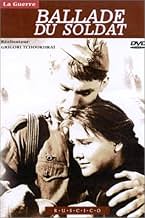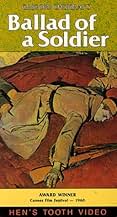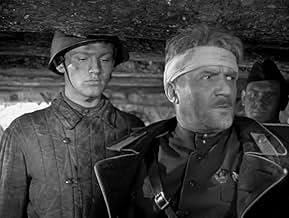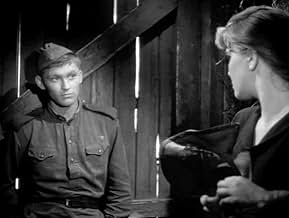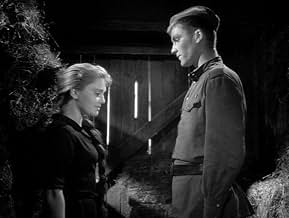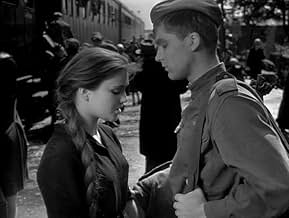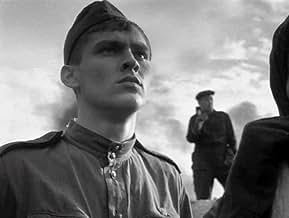NOTE IMDb
8,2/10
12 k
MA NOTE
Le jeune soldat russe Alyosha se voit décerner une médaille, mais, à la place, il demande à rendre visite à sa mère. Son voyage dépeint plusieurs types d'amour pendant la guerre.Le jeune soldat russe Alyosha se voit décerner une médaille, mais, à la place, il demande à rendre visite à sa mère. Son voyage dépeint plusieurs types d'amour pendant la guerre.Le jeune soldat russe Alyosha se voit décerner une médaille, mais, à la place, il demande à rendre visite à sa mère. Son voyage dépeint plusieurs types d'amour pendant la guerre.
- Réalisation
- Scénario
- Casting principal
- Nommé pour 1 Oscar
- 6 victoires et 4 nominations au total
Vladimir Ivashov
- Alyosha Skvortsov
- (as Volodya Ivashov)
Mariya Kremneva
- Elizaveta Petrovna (Pavlov's Wife)
- (as M. Kremnnyova)
Avis à la une
Ballad of a Soldier (1959)
An old fashioned but utterly gorgeous film about a soldier discovering something bigger about himself than even the war could teach him on the battlefield. It's a drama about life, photographed with what strikes me as a European poetic visual sensibility. In its lyrical flow, it is amazing. No other word for it.
In 1959, the Soviet Union was only 14 years away from the end of the war that cost them 23 million deaths (10 million of these were soldiers). And a ravaged countryside. This is monumental in a way that we Americans have trouble appreciating, even though our own losses were around 1 million, including civilians directly and indirectly. But with this kind of staggering history, the very touching tale of a very innocent boy wanting to get back to his mother for a single hug is heart wrenching. Director Grigori Chukhrai, himself Ukrainian, seems to know that his role, in the Khrushchev era of Cold War USSR, is to show the best of the Soviet heart and soul.
The journey, for the viewer, is often filled with silence, and with carefully composed shots of the boy, alone or with other travelers (often soldiers). The light and the framing is moving even on its own terms. Many times the key face in foreground is sharp and softly stark while many other faces fall out of focus around this, camera tilted, or looking up, with flickers of light from trees outside the train window or a diffused glow of a grey sky drenching it all with melancholy.
Alyosha, the young man who by some fast wits and luck knocked out two tanks in the first scene and earned this special trip, meets a variety of people on his way who each represent a part of the Soviet (mostly Russian, but with a nod to Ukrainians) experience: a wounded man going home without his leg, a young conscript heading to the front to probably never return, this same young man's father in a hospital apparently dying, and a girl his own age, equally pure and nearly untouched by life's horrors. In every case, there is a kind of Soviet optimism that is almost refreshing even if it is just slightly reminiscent of their earlier propaganda movies. Because, the wounded man meets his wife at the station and is renewed, the young conscript is cheerful and hale, the father is proud and glad his son is a good soldier, the mean officer has an understanding heart, the sergeant gives his only soap to the traveller, and so on.
But this kind of goodness is part of what makes the film special. There is no room for noir cynicism, or even existential loneliness. After all, Alyosha has found the truest of true love, and even though he may be returning to the war to never return, the boy and girl have elevated each other, and the movie, and the viewer, with a real sense of what being good is all about. If you can find this movie, see it by all means.
An old fashioned but utterly gorgeous film about a soldier discovering something bigger about himself than even the war could teach him on the battlefield. It's a drama about life, photographed with what strikes me as a European poetic visual sensibility. In its lyrical flow, it is amazing. No other word for it.
In 1959, the Soviet Union was only 14 years away from the end of the war that cost them 23 million deaths (10 million of these were soldiers). And a ravaged countryside. This is monumental in a way that we Americans have trouble appreciating, even though our own losses were around 1 million, including civilians directly and indirectly. But with this kind of staggering history, the very touching tale of a very innocent boy wanting to get back to his mother for a single hug is heart wrenching. Director Grigori Chukhrai, himself Ukrainian, seems to know that his role, in the Khrushchev era of Cold War USSR, is to show the best of the Soviet heart and soul.
The journey, for the viewer, is often filled with silence, and with carefully composed shots of the boy, alone or with other travelers (often soldiers). The light and the framing is moving even on its own terms. Many times the key face in foreground is sharp and softly stark while many other faces fall out of focus around this, camera tilted, or looking up, with flickers of light from trees outside the train window or a diffused glow of a grey sky drenching it all with melancholy.
Alyosha, the young man who by some fast wits and luck knocked out two tanks in the first scene and earned this special trip, meets a variety of people on his way who each represent a part of the Soviet (mostly Russian, but with a nod to Ukrainians) experience: a wounded man going home without his leg, a young conscript heading to the front to probably never return, this same young man's father in a hospital apparently dying, and a girl his own age, equally pure and nearly untouched by life's horrors. In every case, there is a kind of Soviet optimism that is almost refreshing even if it is just slightly reminiscent of their earlier propaganda movies. Because, the wounded man meets his wife at the station and is renewed, the young conscript is cheerful and hale, the father is proud and glad his son is a good soldier, the mean officer has an understanding heart, the sergeant gives his only soap to the traveller, and so on.
But this kind of goodness is part of what makes the film special. There is no room for noir cynicism, or even existential loneliness. After all, Alyosha has found the truest of true love, and even though he may be returning to the war to never return, the boy and girl have elevated each other, and the movie, and the viewer, with a real sense of what being good is all about. If you can find this movie, see it by all means.
Many Americans suffered enormously on account of WWII. My own grandmother, who not only survived the Great Depression but also World War I while it was being fought right in her own Polish town, once said that the most difficult event in her life was sending two of her sons off to battle in the faraway Pacific theater. One of them ended up in heavy combat on Okinawa, and the other one served as a bombardier.
As hard as World War II was for so many Americans, including my grandmother and my uncles, I believe that it was even more difficult for the Russians as a people. The terror of war came to their very doorsteps, civilians and warriors alike, and it was inescapable for them. Regardless of any specific political situation or attempt at propaganda by either side, I think that this historical fact must be objectively recognized and respected.
A "ballad" is a form of poetry, and, for me, "Ballad of a Soldier" is where poetry meets the camera. At the very beginning, the mother of the young, hero soldier who is the central character of the film looks out at the one unpaved road that leads in and out of her village. Somewhere at the end of the road, where ever that may be, is her beloved son. Overhead is an unforgiving sky, representing a sense of the power that controls all.
On the battlefield, we are terrified by a tank that is determined to chase our hero soldier through the countryside until he somehow manages to secure a position in order to destroy it and one other. Recognized by his superiors for his heroism, instead of a medal he requests a furlough pass to say farewell properly to his mother and to fix her leaking roof. It is granted for only a few days. Under the time pressure, the viewer witnesses his long, harrowing journey home from the front, experiencing the chaos, displacement, and hardship of the war on civilians and soldiers alike. In the mayhem and the confusion, he also manages to find true love at a most unexpected time and place.
I am sorry that this film was unavailable to me as a ten year old child in 1959 when it was produced. Aside from the political climate that prevailed at the time, which was mostly filled with fear, perhaps I would have been old enough to judge that Russian people were of the same flesh and blood that I was and that their lives, not only as Russians but as human beings, were affected very seriously by the horrors of war. While it would have been a very important lesson for me at the time, it did not come too late for me 57 long years later. This is a beautiful movie. See it!
As hard as World War II was for so many Americans, including my grandmother and my uncles, I believe that it was even more difficult for the Russians as a people. The terror of war came to their very doorsteps, civilians and warriors alike, and it was inescapable for them. Regardless of any specific political situation or attempt at propaganda by either side, I think that this historical fact must be objectively recognized and respected.
A "ballad" is a form of poetry, and, for me, "Ballad of a Soldier" is where poetry meets the camera. At the very beginning, the mother of the young, hero soldier who is the central character of the film looks out at the one unpaved road that leads in and out of her village. Somewhere at the end of the road, where ever that may be, is her beloved son. Overhead is an unforgiving sky, representing a sense of the power that controls all.
On the battlefield, we are terrified by a tank that is determined to chase our hero soldier through the countryside until he somehow manages to secure a position in order to destroy it and one other. Recognized by his superiors for his heroism, instead of a medal he requests a furlough pass to say farewell properly to his mother and to fix her leaking roof. It is granted for only a few days. Under the time pressure, the viewer witnesses his long, harrowing journey home from the front, experiencing the chaos, displacement, and hardship of the war on civilians and soldiers alike. In the mayhem and the confusion, he also manages to find true love at a most unexpected time and place.
I am sorry that this film was unavailable to me as a ten year old child in 1959 when it was produced. Aside from the political climate that prevailed at the time, which was mostly filled with fear, perhaps I would have been old enough to judge that Russian people were of the same flesh and blood that I was and that their lives, not only as Russians but as human beings, were affected very seriously by the horrors of war. While it would have been a very important lesson for me at the time, it did not come too late for me 57 long years later. This is a beautiful movie. See it!
10Rueiro
This is one of the greatest anti-war movies ever made and a touching little human drama that has not lost any of its power after half a century. After fifteen years since I first saw it, it remains among my ten favourite movies of all time from any country. It is full of poetry and visual beauty; a humble masterpiece from a young director at that time, who encountered all sorts of problems and restrictions during the shooting. Nevertheless, his perseverance to bring this work to life and the touchingly realistic performances of the cast make of this movie not only one of the best films that ever came out of the Soviet Union but also a classic gem of world cinema.
"A single death is a tragedy; a million deaths is a statistic" is the famous quote by Stalin. In this movie we see a marvellous illustration of the sentiment.
Don't worry; I didn't spoil anything. We learn from the opening narration that this is the story of a fallen hero. With that in mind, the atmosphere of impending tragedy colours the entire film despite the film's rather charming presentation. It's a wonderful irony, because the director opens with such a powerful & nihilistic statement, but then he follows with a sweet and inspiring presentation which you might even call "innocent".
I'm not exactly a fan of war movies, but I don't consider this to be one at all. There are very few details about the war, no politics, no propaganda. Essentially you can replace the Russian uniforms with British, German or Japanese, and the story would remain the same--"The Ballad of a Soldier". Oddly enough, it's the compelling portrayal of rustic life (which he encounters along his journey) that provides the backbone and theme of this film, a very human story.
It reminds me of the Italian classic "Bicycle Thieves" as well as the Japanese masterpiece "Ikuru" by Kurosawa. Each scene packs a lot of heart, and the grand finale brings it all together poetically and artistically. I won't mention any names, but I sure wish certain other artsy Russian directors could be as lucid and authentic in their presentations.
One more thing... I can't end this review without mentioning the SUPERB MUSIC. The composer is listed as Mihkail Ziv, but IMDb offers no biographical info on him. The melody is powerful and epic while being traditional and intimate at the same time. It really mirrors the theme of the film perfectly: things of great importance come in simple packages.
This movie gets 9 stars from me, which is about the highest rating I ever give. See it if you ever get the chance.
Don't worry; I didn't spoil anything. We learn from the opening narration that this is the story of a fallen hero. With that in mind, the atmosphere of impending tragedy colours the entire film despite the film's rather charming presentation. It's a wonderful irony, because the director opens with such a powerful & nihilistic statement, but then he follows with a sweet and inspiring presentation which you might even call "innocent".
I'm not exactly a fan of war movies, but I don't consider this to be one at all. There are very few details about the war, no politics, no propaganda. Essentially you can replace the Russian uniforms with British, German or Japanese, and the story would remain the same--"The Ballad of a Soldier". Oddly enough, it's the compelling portrayal of rustic life (which he encounters along his journey) that provides the backbone and theme of this film, a very human story.
It reminds me of the Italian classic "Bicycle Thieves" as well as the Japanese masterpiece "Ikuru" by Kurosawa. Each scene packs a lot of heart, and the grand finale brings it all together poetically and artistically. I won't mention any names, but I sure wish certain other artsy Russian directors could be as lucid and authentic in their presentations.
One more thing... I can't end this review without mentioning the SUPERB MUSIC. The composer is listed as Mihkail Ziv, but IMDb offers no biographical info on him. The melody is powerful and epic while being traditional and intimate at the same time. It really mirrors the theme of the film perfectly: things of great importance come in simple packages.
This movie gets 9 stars from me, which is about the highest rating I ever give. See it if you ever get the chance.
In World War Two, almost thirty million Russian soldiers and civilians were killed in the fight against fascism, a fact mainly ignored during the paranoia of the Cold War. In our attempt to demonize everything Russian, we also overlooked stories of individual heroism. In 1959, Russian director Grigory Chukhraj made a film attempting to describe "what happens when the world loses a single person" and it is a masterpiece. The beautiful and moving Ballad of a Soldier tells a personal story that illuminates how war can ravish both an individual and a country. The film is set in Russia in the midst of the war. Pvt. Alyosha Skvortsov (Vladimir Ivashov), a signaller, has earned a commendation by destroying two German tanks. Instead of accepting a medal, he requests to be granted a four-day leave to go home and visit his mother.
We learn early through the narration that this soldier did not survive the war so his journey home to visit his mother for one last time becomes all the more poignant. The film, however, is not about a destination but about a journey. The four-day trip encompasses a lifetime of experience. Before hiding out in a freight car, Alyosha encourages a soldier (Yevgeny Urbansky) who has lost his leg to go home to his wife. Along the way, he hitches a ride on a rain-soaked road with a woman deprived of sleep for 48 hours. He brings a present of soap to an unfaithful wife of another soldier but changes his mind and gives it to her father who longs for his son's return. He also meets Shura (Zhanna Prokhorenko), a radiant young woman who, like him, hides out in a freight car. Reluctant at first and fearful of Alyosha, the young couple experiences their first love in several sensitive scenes but it is to be short-lived.
Ballad of a Soldier, of course, aims to present Russian soldiers in the best possible light yet Chukhraj does not hesitate to show his characters as real human beings with flaws. A venal security guard is willing to grant the young soldier free passage in a freight car in exchange for cans of beef, and the wife of a soldier is unfaithful to her soldier husband, a sequence that landed the director in trouble with the Russian censors. In Alyosha, Chukhraj has created a good person: kind, loving, and noble but not larger than life, a soldier perhaps typical of millions of young men who gave their lives to protect their homeland. Their struggle and personal sacrifice has been immortalized in a great film.
We learn early through the narration that this soldier did not survive the war so his journey home to visit his mother for one last time becomes all the more poignant. The film, however, is not about a destination but about a journey. The four-day trip encompasses a lifetime of experience. Before hiding out in a freight car, Alyosha encourages a soldier (Yevgeny Urbansky) who has lost his leg to go home to his wife. Along the way, he hitches a ride on a rain-soaked road with a woman deprived of sleep for 48 hours. He brings a present of soap to an unfaithful wife of another soldier but changes his mind and gives it to her father who longs for his son's return. He also meets Shura (Zhanna Prokhorenko), a radiant young woman who, like him, hides out in a freight car. Reluctant at first and fearful of Alyosha, the young couple experiences their first love in several sensitive scenes but it is to be short-lived.
Ballad of a Soldier, of course, aims to present Russian soldiers in the best possible light yet Chukhraj does not hesitate to show his characters as real human beings with flaws. A venal security guard is willing to grant the young soldier free passage in a freight car in exchange for cans of beef, and the wife of a soldier is unfaithful to her soldier husband, a sequence that landed the director in trouble with the Russian censors. In Alyosha, Chukhraj has created a good person: kind, loving, and noble but not larger than life, a soldier perhaps typical of millions of young men who gave their lives to protect their homeland. Their struggle and personal sacrifice has been immortalized in a great film.
Le saviez-vous
- AnecdotesThe can of meat the train guard is eating from was clearly marked: "U.S. Meat". This would have been correct in actual life due the United States' Lend Lease with the Soviet Union.
- GaffesThe movie is set in July 1942 (a news report over loudspeakers mentions a Soviet retreat from Rostov and Voronezh). Yet the film depicts German Tiger and Soviet T 34/85 tanks, which came into service, respectively, in mid 1943 and early 1944.
- Citations
Alyosha Skvortsov: Comrade General, instead of my decoration, could I go home to see my mother?
- ConnexionsFeatured in Fejezetek a film történetéböl: A szovjet film 1953-1970 (1990)
Meilleurs choix
Connectez-vous pour évaluer et suivre la liste de favoris afin de recevoir des recommandations personnalisées
- How long is Ballad of a Soldier?Alimenté par Alexa
Détails
- Durée1 heure 28 minutes
- Couleur
- Mixage
- Rapport de forme
- 1.37 : 1
Contribuer à cette page
Suggérer une modification ou ajouter du contenu manquant

Lacune principale
By what name was La ballade du soldat (1959) officially released in India in English?
Répondre
